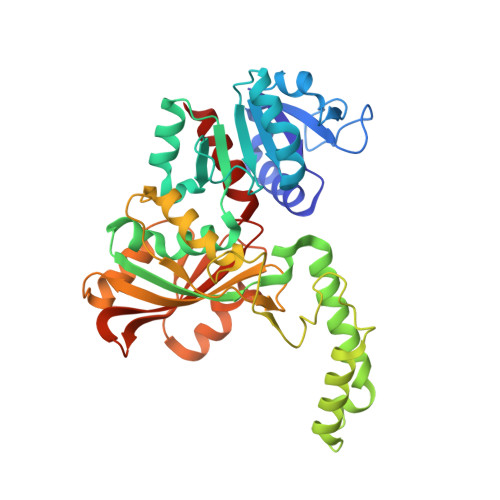A structural Basis for the Mechanism of Aspartate-beta-semialdehyde Dehydrogenase from Vibrio Cholerae
Blanco, J., Moore, R.A., Kabaleeswaran, V., Viola, R.E.(2003) Protein Sci 12: 27-33
- PubMed: 12493825
- DOI: https://doi.org/10.1110/ps.0230803
- Primary Citation of Related Structures:
1MB4, 1MC4 - PubMed Abstract:
L-Aspartate-beta-semialdehyde dehydrogenase (ASADH) catalyzes the reductive dephosphorylation of beta-aspartyl phosphate to L-aspartate-beta-semialdehyde in the aspartate biosynthetic pathway of plants and micro-organisms. The aspartate pathway produces fully one-quarter of the naturally occurring amino acids, but is not found in humans or other eukaryotic organisms, making ASADH an attractive target for the development of new antibacterial, fungicidal, or herbicidal compounds. We have determined the structure of ASADH from Vibrio cholerae in two states; the apoenzyme and a complex with NADP, and a covalently bound active site inhibitor, S-methyl-L-cysteine sulfoxide. Upon binding the inhibitor undergoes an enzyme-catalyzed reductive demethylation leading to a covalently bound cysteine that is observed in the complex structure. The enzyme is a functional homodimer, with extensive intersubunit contacts and a symmetrical 4-amino acid bridge linking the active site residues in adjacent subunits that could serve as a communication channel. The active site is essentially preformed, with minimal differences in active site conformation in the apoenzyme relative to the ternary inhibitor complex. The conformational changes that do occur result primarily from NADP binding, and are localized to the repositioning of two surface loops located on the rim at opposite sides of the NADP cleft.
Organizational Affiliation:
University of Toledo, Department of Chemistry, Toledo, OH 43606, USA.
















